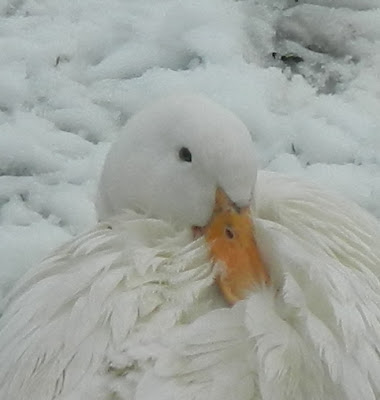
Whatever you can do or dream you can, begin it.
Boldness has genius, power and magic in it!’
Anita Mathias: Dreaming Beneath the Spires
Anita Mathias's Blog on Faith and Art



| Duck tracks |
| Pheasant tracks (I think) |
| Helleborus Foetidus |
| The stile before our veggie garden |
| Hellebore buds under the snow
Doorway into a snowy world
The building you see in my detached study, where I write
|
 |
A mosaic in Ravenna, made of millions of broken tessarae of glass and enamel
The principle runs through all life from top to bottom. Give up yourself, and you will find your real self. Lose your life and you will save it. Submit to death, death of your ambitions and favourite wishes every day: submit with every fibre of your being, and you will find eternal life. Keep back nothing. Nothing that you have not given away will be really yours. Nothing in you that has not died will ever be raised from the dead. (C.S. Lewis, Mere Christianity).
“Christianity can only be caught, not taught,” they say. I caught a lot while I was discipled from 1997 to 2002 by a deep, sincere Christian writer and leader. He said that as he found himself becoming intense–a sign that self was on the throne, not Christ–he’d say, “Take that too. I surrender that to you, Jesus,” and so on, until it became a habit to surrender everything precious to him, everything he worried about, to Jesus.
We swapped my editing of his first book for spiritual guidance. He didn’t seem a naturally gifted writer, and I think I helped him find his natural speaking voice and rhythms in writing.
Interestingly, he said that he did not own his writing. He had given it to God. And whereas I wasted a lot of time on false starts, he wrote to just three publishers, one of whom took his first book. Several reviewers have said his next book was one of the best books on prayer of all time, and that’s because it sprung from the heart, spirit and experience, not from study, reading or the head.
What impressed me was that someone who did not seem naturally gifted as a writer could so rapidly write two good books. Was not “owning” his writing a factor? He said he wrote as God provided time, whereas I was always trying to grab, steal, wrangle time, which caused me a lot of stress.
He said once that he owned the Christian charity he founded far more than his writing. And that, 13 years on, has never really taken off, perhaps for this reason.
* * *
If we are managing something–a career, a business, our parenting, a blog, then if we are competent and talented, we may well do well.
However, when we surrender it to God, he takes it, blesses it, and frequently breaks it–breaking our heart in the process. And uses those broken fragments to feed the 5000. Miracles happen!
It so makes me want to make sure that everything I have is owned by God. But there are no shortcuts to this surrender. It comes when the mind, spirit and emotions, together say the Fiat, Let it be done to me according to thy will.
Nothing can be sole or whole that has not been rent, Yeats writes.
I wanted to surrender my writing to God, but it was so much a part of my identity. The only thing I have wanted to do since I was 21 was to write, and I felt that if I didn’t have a published book, I would be a failure. Having a husband who was very successful as a mathematician didn’t help either.
I tried and tried to surrender my writing to God. To say, “Lord, if I never get a book published, that’s fine. If I’m never well-known as a writer, that’s fine. If all my writing projects fail, are never finished, remain drafts on my computer, that’s fine. All I want is you.”
But I would get tearful as I said that—and had not yet reached the point where it was OK if I never published a book, was never read, never known. My whole identity and desire-life was bound up with success as a writer that I felt if that failed, I’d have failed. I would be no one. Nothing.
And well, I needed a period of being no one and nothing for that dream to die. I discovered there is freedom in it. You just relax and enjoy people, and don’t have to bother about snicking into the conversation that you had won a $20,000 National Endowment for the Arts award, or a $6000 State Arts Board Award, or were published in the Washington Post, London Magazine, Commonweal, The Best Spiritual Writing anthologies etc. (See, I am showing-off here, and it’s making me feel tired!!:-)
Surrendering your dreams is no easy matter. The mouth may say: “I surrender all,” but the heart may shrink. I fancy people go through the same struggle with singleness, childlessness, with a terminally ill child or spouse, with cancer or terminal illness.
* * *
I definitely don’t own my blog. I started blogging because I felt God telling me too, and it is in his hands. I have relatively firm time limits for how long I spend on it—an hour a day writing, and another 15 minutes or so responding to comments. When I want to promote it, I pray as a first recourse, partly because I am too low-energy to do much else. And, the fact that the blog is God’s is my salvation, because there is so much potential for promoting a blog, the most egalitarian art-form, that I would otherwise exhaust myself.
My other writing? Well, of course, it now belongs to God. I do it as he provides time, energy and organization.
* * *
It did take that long period in which I could not write at all because I was establishing our family’s publishing business for the ambition of writing to die–for me to write because it is my vocation and calling, rather than my ambition.
The funny thing about giving your dreams to God, about not owning them is that it happens in its own time. You cannot make the surrender happen, no more than you can make yourself fall in love. It’s a funny mixture of the heart and will. I remember saying in a women’s breakfast speech at Williamsburg Community Chapel, how my struggle with writing was “Give it to Him, take it back; give it to Him, take it back.”
Well, that’s done with. It’s totally surrendered. I wouldn’t dream of taking it back (I think!).
“I truly can’t manage it, Lord; you manage it,” I say.
* * *
My other struggle, sadly, is with weight. And, to be honest, I don’t have a shadow of a chance of winning that on my own, either. I can only do it by putting it in God’s hands, and making it his problem.
Here’s a joke I heard Max Lucado tell in his audiobook, Travelling Light.
Tom walks down the street and meets Dick, who is grinning from ear to ear.
Tom, “What are you so happy about?”
Dick, “Well, I’ve met a man who promised to do all my worrying for me for $67,000 a year.”
Tom, “$67,000 a year. How are you going to get that?”
Dick, grinning, “That’s HIS worry!”
Yes, Lord, take my physical health and my writing. Please manageoth. The Lord is my personal trainer. I shall be fit. The Lord is my Literary Agent. I shall write well.

When he was 40, a serious sports injury left him immobile; his girlfriend asked him to move out, his work made him redundant. So he was left single, homeless, jobless, and immobile, and had to move back with his parents. It was his Jacob moment. He surrendered his life to Christ, invited all his siblings and friends to a ceremony at which he burnt his last cigarette, and never smoked one again.
Another was from a pastor. As a teenager, his mother who was dying of cancer, killed his father who was leaving her, six months before her own death. Grief-stricken, he slipped: heroin, cocaine, alcohol, all causing deep physical damage. In despair, he cried out to God, “If you are real, take away my desire for drugs.” Well, God did. He gave up drugs, and is a driven and passionate evangelist, out of gratitude to God who set him free.
Very cool.
· * * *
How I love these stories of instant dramatic change!
Mine, however, has not been like that. It has been slow, slow, slow, but, nevertheless I have changed.
I had a fiery temper, and over the last decade, have learnt to get it under control, though I still lose it some!! But there is much freedom and joy in thinking things over, thinking about the objective I want to achieve, remembering Jesus, changing addresses, so to say, moving myself away from maelstrom of anger and indignation into living in Jesus, surrounded by him.
Roy, though the sweetest and most helpful of husbands, also has a fiery temper when he’s over-tired, or over-provoked–and I used to wonder if it was escapism to retreat to a quiet place of God’s love and eternal truths, in the Psalms for instance, while his anger reverberated fearsomely. (He’s generally mild, but when he loses his temper, well…).
I decided: Nope, it wasn’t escapism. The Rock of Truth is the rock, no matter how tempestuous the ocean. God’s love is steady, despite the storm. Scripture is an axis for one’s life, even if someone has just lost their temper with you, making your internal world feel unsteady. So mentally and spiritually, in family life, you sometimes need to go into your room, lock the door, and sail away into the quiet sea of God’s love. Taste the truths which are always true.
Yeah, that battle with out-of-control anger is mostly won, I believe. I can process my anger with God rather than the person. The battle with forgiveness is not as huge as it used to be. As far as my deceitful heart knows, I walk in forgiveness, fully achieved, or in process!
The battle with untidiness is in process, but yeah, it’s in a virtuous circle. I’m winning.
* * *
So what battle do I now wage with Appolyon? Which, as in Bunyan’s Pilgrim’s Progress can only be won by the two-edged sword of the word of God and prayer.
I believed I had no addictions, after I broke my coffee addiction.
Not so. I have finally acknowledged a embarrassing, deep-rooted habit to myself, which is perhaps an addiction.
James says: Is anyone among you in trouble? Let them pray. Is anyone happy? Let them sing songs of praise.
Well, I sometimes have.
But my default method of dealing with uncomfortable emotions gets quick results. Sad, low-spirited, depressed—Eat chocolate. Happy and high—eat chocolate, which I unconsciously associate with happiness. Stressed, bored, empty—eat chocolate.
Chocolate works; it produces results. It contains tryptophan, which triggers the release of endorphins and serotonin, which decrease stress and depression. It contains phenylethylamine, the “chocolate amphetamine” which raises blood pressure and blood-sugar, helping one feel excited and alert. Its anandamide activates dopamine, the neurotransmitter which gives us a sense of well being. Its theobromine produces a sense of mental and physical relaxation and increased alertness.
There are other things which help me feel as high as chocolate does. I can listen to scripture while jogging or dancing. I can read beautifully written spiritual books which can make me feel hyper and excited: Ann Voskamp’s One Thousand Gifts, or Frederick Buechner, or Willard’s Divine Conspiracy or Piper’s Desiring God. Playing worship music while dancing or tidying up induces a change of emotional state. As does prayer.
Or running. Or yoga or gardening.
But, you see, chocolate, or chocolate biscuits, or crisps, or comfort food—ah, that induces a change of state far more rapidly!
There is a way that seems right to a man, but in the end it leads to death. (Proverbs 16:25).
Ah, haste. Hurry up. Quick. Fast. Speed. Words which are death to the spiritual life. Dallas Willard writes “Haste has worry, fear, and anger as close associates; it is a deadly enemy of kindness, and hence of love.”
· * * *
So, to be honest, this is the humililating “Valley of Humiliation” in which I currently battle Appolyon–my tendency to medicate stress, boredom, sadness, low mood, reverses, life with a highly-strung family with food, especially chocolate and sweet stuff.
And so I am trying to break a habit I started in my teens. Low mood: eat. Stressed: Eat. Bored: Eat.
Put off, put on: That’s a consistent New Testament formula.
Put off mindless seeking for comfort in things which will cause distress later (weight gain, and being excessively hyper).
Put on: stopping work when chocolate craving overwhelms. Changing the activity. Seeking joy in God who delights the soul as with the richest of foods. Exercise with Scripture. Read a spiritual book, some good old lectio divina.
Yeah, it’s a bit embarrassing that I am waging this sort of low-level spiritual battle after being a Christian for 22 years.
But waging it, I am, and I am determined to win.
I so want to change, and taste God, and the pleasures of God when I am low-spirited, bored, stressed or depressed instead of the quick, easy, deceitful pleasures of chocolate.

 |
| Our Aylesbury and Indian Runner duck resting in the snow with beaks tucked under the ir wings. |
 |
| A closeup |
Hardy kale is just as green and upright as ever
Snow attached to the windward side of trees
Frost on the car window

 |
| Image Credit |

 |
| Lewis nature reserve (image credit) |
The spiritual world is as real and present at all times as the material world, but at particular times and places we may become more aware of that deeper level of reality. ‘Thin places’ are the places where heaven and earth can be felt as palpably intersecting, where the Kingdom of Heaven feels genuinely ‘at hand,’ as if we could turn a corner or push open an unlatched door and enter in.
I wrote ‘Broceliande’ after a stay in Oxford and the discovery that the fields and forests of Oxford were a ‘thin place’ for me. One of the images here comes from my reading of Charles Williams’ poetry cycle, Taliessin Through Logres, in which the forest Broceliande mystically connects all times and places. One of the things that reading Williams has done is to push me to reconsider my assumptions about time and space. Here is my poem; you can read the rest of my reflection, and hear my reading of the poem, on my blog Hieropraxis.
Broceliande
(walking the Lewis Reserve, January 2012)
Today I walked in woods that Jack once knew
And loved. I thought I was a stranger here,
That this was just a visit, passing through.
Not so. In blood and bone I feel the near
And lively presence of the well-loved past.
The woods of my New England childhood, clear
In memory, bright but far, are here. The forest
Intersects each time and place: this is
Broceliande. I feel a joy unguessed
To walk these strange familiar paths, and with
The joy, the ache of sudden love. I know
These tangled ferns, this squelchy trodden path,
The whisper-crunch of leaves, the fallen boughs
Green-furred with moss; this steeply rising hill
Is Oxford with New England’s granite bones.
The wood is thick with holly, green and tall:
A tree not native to my native land,
But rooted here for me, my namesake still.